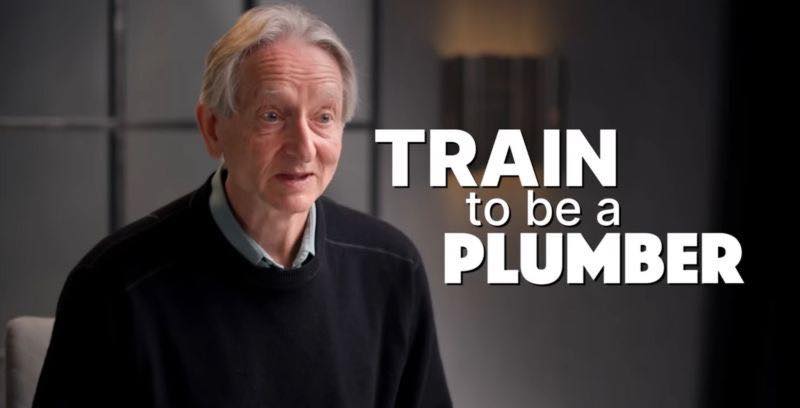Geoffrey Hinton, often called the “Godfather of AI,” has sounded an urgent alarm about the future of work in the age of artificial intelligence. In a recent appearance on the Diary of a CEO podcast, Hinton predicted what many are now calling the “AI jobpocalypse.”
His argument is blunt and specific: AI is poised to replace jobs involving routine intellectual labor far sooner than most people expect.
“For mundane intellectual labor, AI is just going to replace everybody,” Hinton said, pointing directly at roles like paralegals, call-center staff, and entry-level office workers as the first to be automated out of existence.
He was particularly blunt in his assessment of the risks faced by customer service workers, warning, “I’d be terrified to work in a call center right now.”
According to Hinton, where a typical office task may have once required a team of ten, soon it might only need one employee—supported by a powerful AI assistant.
The underlying reason is straightforward: AI technology excels at tasks that are repetitive, predictable, and involve working with text or data. Examples include drafting legal memos, summarizing documents, or processing customer support tickets.
These forms of routine cognitive labor can be automated rapidly, while jobs that demand physical dexterity, problem-solving on the fly, and manual skill—such as those of plumbers and electricians—are much harder for machines to replace.
Hinton’s advice, delivered with a dose of irony, is crystal clear: “It’s going to be a long time before AI is as good at physical manipulation… so a good bet would be to be a plumber.” Essentially, he suggests that hands-on trades are far safer from automation than intellectual desk jobs.
As artificial intelligence rapidly transforms many areas of work, blue collar trades like plumbing, electrical work, construction, and other skilled manual jobs are emerging as some of the most resilient careers in the face of automation.
Blue collar and skilled trades are generally less susceptible to AI takeovers than routine office-based jobs.
According to a recent survey, 53% of people believe that fields like construction and plumbing are among the safest from automation, especially compared to many at-risk white-collar occupations.
AI and automation will change how trades are performed, but the need for skilled human workers will not disappear—it may actually increase due to growing demand and retiring talent. Jobs requiring hands-on craftsmanship, human creativity, and flexibility are among the least likely to be fully automated in the coming decades.
Hinton’s warnings go beyond just job displacement for white collar workers. He predicts that as AI grows smarter, even highly skilled knowledge workers will need to adapt: “You’d have to be very skilled to have a job that AI just couldn’t do.”
And while some propose social solutions such as universal basic income, Hinton points out the deeper human challenge—many people derive a sense of meaning and purpose from their work, and losing that could have profound consequences for society.
Research supports much of Hinton’s outlook. Studies by firms like McKinsey and Goldman Sachs estimate that by the 2030s or 2040s, up to half of today’s jobs could see parts of their tasks automated, with the most routine office jobs being the most exposed.
Already, AI tools are being used in the legal industry for tasks like document review, and companies deploy AI-powered chatbots to handle customer service tickets and inquiries.
While these technologies can boost productivity, they also reduce the demand for traditional entry-level office roles, accelerating workforce changes.
Not all sectors will be hit the same way. Healthcare work, for instance, will continue to demand human empathy, ethical judgment, and nuanced decision-making, making it less vulnerable to wholesale automation.
Creative roles and jobs built around direct human connection or complex real-world environments are similarly safer—for now.
Hinton’s message is ultimately a call to prepare for dramatic changes. Workers, he suggests, should focus on building roles that collaborate with AI—such as auditing or managing the output of AI systems—rather than competing with them.
Meanwhile, trades that depend on skilled physical labor and real-world adaptability may become both more secure and more valued.
As the world moves further into the AI era, Hinton’s final prediction underscores just how disruptive this transformation could be: “AI will replace everybody doing routine cognitive work—but it’s going to take us decades to figure out what meaningful work even means anymore.”
For now, his warnings serve both as caution and as guidance, urging workers and societies alike to rethink how to stay relevant and find meaning in a changing world.
Why Pursue a Skilled Trade in the Age of AI?
-
Trades like plumbing and electrical work are much harder to automate and remain in demand.
-
Real-world problem-solving and manual skills keep trades shielded from mass automation.
-
AI enhances productivity and safety, creating a collaborative future for tech-aware tradespeople.
-
Labor shortages mean higher potential pay and job security for skilled workers.
-
Adaptability and ongoing learning will keep trade professionals relevant as new tools emerge.
-
Blue collar trades align with future-proof, AI-resistant career paths—offering meaningful, stable work as the economy evolves.
In summary, blue collar trades are among the safest bets for a future-proof career in the AI era, offering a meaningful blend of hands-on work, practical problem solving, and the potential to harness technology as an ally rather than a threat.
SOURCES:
The Rise of Skilled Hands In An AI World: Why Plumbing, Welding, And Electric Work Are The Future
The Rise of Skilled Hands In An AI World: Why Plumbing, Welding, And Electric Work Are The Future
https://www.uscareerinstitute.edu/blog/65-jobs-with-the-lowest-risk-of-automation-by-ai-and-robots

I’m Moe, the founder of Service Mammoth. I’ve been in home services and marketing for over 25 years and use that knowledge to help businesses grow.

